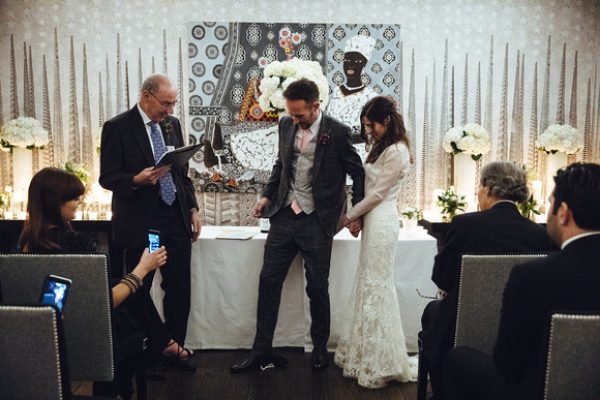
by Michael | May 29, 2018 | Blog
To many people, a wedding needs to be either fully religious or else secular (held in the register office). Well, those won’t float everybody’s boat.
Fortunately, you do have wedding choices. One is to opt for a civil celebrant .
Lots of people don’t know that civil celebrants even exist, so here are some Qs & As that should be beneficial.
Can a celebrant marry me legally?
The short answer, according to current English legislation, is no. However, there are two workable options to allow you to marry legally and also to enjoy the ceremony that you actually want.
1) you can have registrars in attendance (provided the venue has the appropriate licence); when they’ve done the legal bit, they leave and the celebrant can take over and deliver your bespoke ceremony.
2) you can marry legally (with 2 witnesses) at the Register Office the morning or day(s) before the ceremony. The celebrant can then conduct what to all intents and purposes is a full wedding or a wedding blessing ceremony (in the venue of your choice). That way, everything is covered.
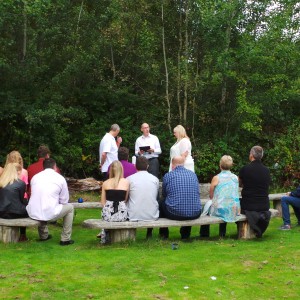
What’s the difference between the Registrar’s and Celebrant’s ceremony?
The short answer is personalisation.
A registrar will follow a script. Their ceremony must contain no religious references. The time-slot is limited (there is usually a ‘conveyor-belt’ system in operation). You won’t normally have met the registrar who will be conducting your wedding.
Certain words have to be said (to make the marriage legal).
None of the above applies to a civil celebrant. The celebrant offers personal and bespoke service. You can choose what goes into – or is left out at- your ceremony. You also have freedom of choice of venue and even hour.
Would it be a humanist service?
It depends on the celebrant. A humanist, like the registrar, is not permitted to offer any religious content. I am not a humanist, but I can conduct secular services. I tailor the service absolutely according to your beliefs and wishes. I have conducted a wonderful handfasting wedding, which was a fusion of paganism and Judaism!
How are celebrants overseen?
Many celebrants belong to a body that has strict codes of ethics (I belong to the AOIC, for example). These normally ensure that standards are being adhered to, although, in my experience, celebrants are professional, competent and trustworthy.
What about fees?
These will vary between celebrants and, obviously, need to take into account travel, possibly, board and lodging, and any unusual accessories requested.
The amount of work that will go into creating and performing a ceremony will depend on the type of ceremony required, so there’s no hard-and-fast rule. Personally, I usually give clients a firm quotation after our initial chat.
My fees include plenty of contact with clients and as many revisions to the script as we need. Naturally, I conduct the service too. There are details of what is included on my website (www.vowsthatwow.co.uk) and I always send a clear summary in my Ts & Cs, once I have had the introductory chat with my clients.
What restrictions are there to the ceremony?
Beyond what I have already mentioned (especially on the legal side), as long as your requirements are within the realms of decency and reason, you can have what you want at your wedding.
- If you want to dance down the aisle or wear Superman outfits, you can!
- You can get married where you want (within reason) – that includes outdoors, of course, and could be in a hot-air balloon, say
- Your ceremony can include your choice of music, readings, rituals and participants
The idea is that I work together with you towards your big day. The ceremony should reflect your personality and be fun (where appropriate), meaningful and memorable.
That’s where a good celebrant comes in …
Please contact me for a chat.
Featured image: www.lyndseygoddard.com
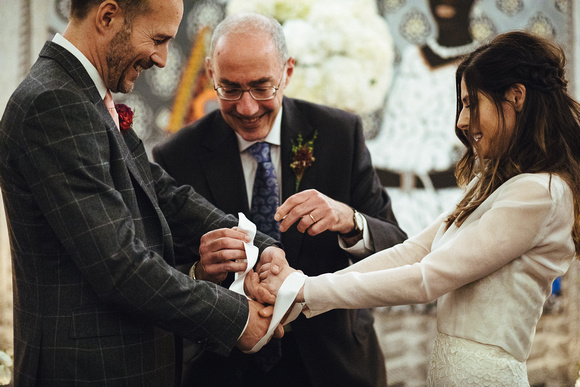
by Michael | May 4, 2018 | Blog
You may know the term “officiant” better as “civil celebrant”. Or you may not have even heard of either term!
If you’re planning a life-cycle ceremony like a wedding, it might be well worth your while to make the acquaintance of either. (By the way, the first term is the American version of the second.)
Why might you need one (or the other!)?
If you’re planning your wedding, it may not be a traditional religious service that rocks your boat. In truth, the idea of a register office ceremony may not appeal too much either. Many people shrug and accept it – “that’s the done thing” – but think again: it doesn’t have to be thus.
What does a wedding celebrant do?
A celebrant will give you ideas, listen to yours, develop them and then write a service that incorporates what you want and that reflects your wishes and personality. They then conduct the ceremony professionally on the day.
The best celebrants have three qualities: they listen well, write well and present well. None of those are particularly common in combination, so don’t underestimate this skill-set.
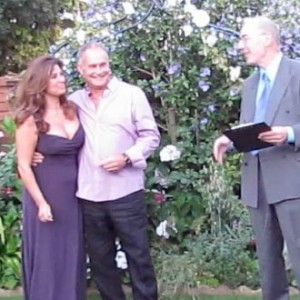
What does a celebrant offer?
- A celebrant will be a trained professional. He (for simplicity, I shall use the masculine throughout) will know what can go into a ceremony and how to structure it, and will be glad to advise and inspire you.
- Celebrants are not usually teenagers or youngsters straight out of college. This is probably not their first job nor is it likely to be their only one at any given time. They usually have some life and work experience, and this can be invaluable for practical and/or imaginative suggestions and advice.
- A good celebrant will take time to listen to you and understand your wishes. If you have an unusual theme or vision, that should not be a problem. The ceremony should reflect your individuality, so it will be tailor-made.
- The celebrant is a kind of choreographer. Depending on your wishes, he can organise entrances and exits, where people stand, how the rituals are enacted and what happens when.
- The celebrant will write a ceremony from scratch. This means that your service will be unique. If the celebrant enjoys writing, he will take trouble to source or compose beautiful and meaningful readings and prayers (as desired). The result will reflect this care and dedication.
- The celebrant will be prepared – indeed, probably keen – to do some research, if you want to introduce something unusual into your ceremony. For example, a particular religious or cultural element.
- The celebrant uses a script. You agree it with him, as you go along. So not only will you have been consulted before and during the creative process but you will not be faced with any unpleasant surprises on the big day. That should be worth quite a lot to your peace of mind!
- Not only does the celebrant need presence but he should be a good presenter. He needs good diction, audibility and the ability to avoid talking in a boring, monotonous drawl. He will be able to project his voice, and vary the pitch, modulation and speed, to bring out the emotion of the moment and involve the audience.
You may well be looking to save some money here and there, and I sympathise entirely. But unless you are very lucky, the chances are that, to find someone who will listen to you, write what you want in a memorable way and present it effectively and professionally, a celebrant will be your answer. (Or an officiant!)
Surprisingly enough, that’s what Michael does for a living! Feel free to contact him for a non-obligation chat.
Main photo: www.lyndseygoddard.com
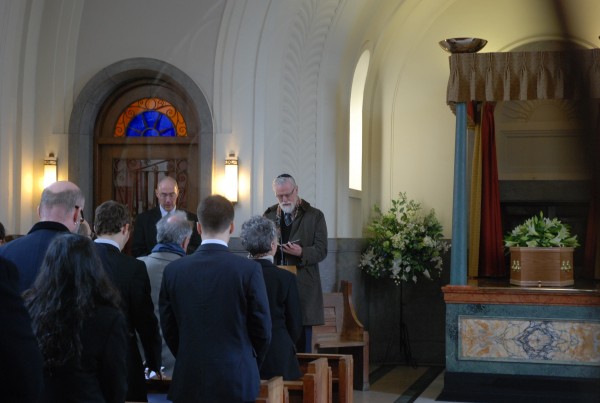
by Michael | Feb 6, 2018 | Blog
I doubt if such a thing exists as a “perfect” funeral. However, I know that Funeral Directors and celebrants like myself normally do their utmost to satisfy needs and desires.
I ought to point out that, as a civil celebrant, my comments here refer to secular or part-religious ceremonies only.
Problems
A difficulty arises if you come up against feuding families. Then compromise is the best you can hope for.
Occasionally, demands are not practical. We were asked to put on a short video display about the deceased during the crematorium service. Unfortunately, the crematorium simply didn’t have the technology to permit this. So we had to say no. (At least I could suggest that the video could be shown at the hotel where the reception would be held.)
Compromise
Not infrequently, all that people want is a fairly standard service. It might – or might not – be religious. It may have a few religious elements. All that is fine. They are not always aware that there are time limits. People simply can’t always have everything they want (unless they book a double slot). They may have to shorten the service to accommodate the eulogy. Or vice versa.
Theme
People may want a theme. I conducted a very Chelsea-heavy service once. (Not easy for a Spurs supporter!) But why not?
Music
What sort of music should there be? Well, that depends on each individual case. People assume they should only play religious or classical music, but there’s no reason for a celebration of life to be too solemn (if that’s the intention). My favourite choice of exit music – for a 92-year-old lady who loved Freddie Mercury – was “Killer Queen”. Guests couldn’t help but smile – indeed, I defy anybody not to, even at such a moment!
Synthesis
How are all these differing needs/wishes put together?
The home visit is key. The celebrant will ask questions, make suggestions and take away a feeling for what is wanted. Then appropriate readings and music can be chosen. The tone can be agreed on.
I always try to get a draft off to the family as soon as possible. Then they can decide if they want anything changed, and – hopefully! – there’ll be time to organise that.
The result might not be perfect, but, hopefully, it will be as near as humanly possible.
If you would like help planning a service (it could be during somebody’s lifetime, incidentally), feel free to give me a call.
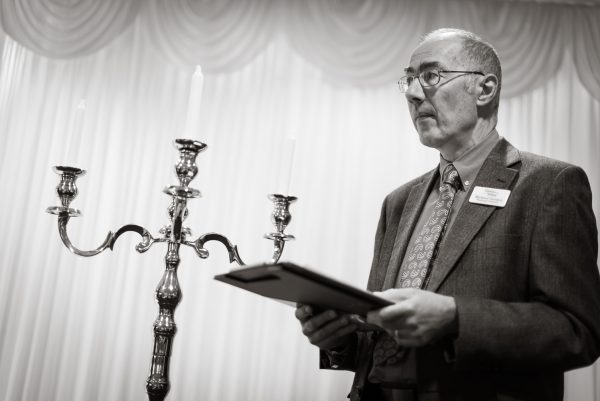
by Michael | Dec 5, 2017 | Blog
Planning to write your own wedding vows? You might be OK with the prospect, but most people doubt they can do it. Worse still, how about delivering the finished product?
It’s very challenging to compose something that will be read publicly. Even more so, if it’s you who will be delivering it.
Cheer up! There are tips you can follow that will help you.
One simple option is to hire a professional to do it for you. Peace of mind in an instant!
The “how”
A civil celebrant is used to public speaking. He conducts weddings, funerals, vow renewals and other ceremonies on a regular basis. Sometimes, the guests number fewer than 10; often, there are more than 100 of them. A good civil celebrant will deliver the texts clearly, beautifully and movingly.
In order to put together the text, the civil celebrant will work with the relevant person(s), normally starting with a home visit. Asking questions and listening intently, the celebrant will draw up a picture of the person being honoured. Once he has sufficient information, he will go away and create a special ceremony.
This will be e-mailed to the client, who can request changes (normally, up till 24 hours before the ceremony). Once the order of service is settled, the client will have seen the final version, and approved every word.
Vows
If vows are to be written, it is lovely if they reflect the couple’s personalities and beliefs. The best people to do that are the couple themselves, of course! However, a celebrant can suggest ideas, offer guidance, so the couple can write something unique. If needs be, he can even do the job for the couple.
Vows can be traditional or modern. They want to be sincere and achievable. They can be solemn, but also funny. Moreover, don’t think that they have to go on too long! Half a minute each may well be all it takes.
Presentation
There are various choices available to you, when delivering your vows.
You can memorise what you want to say. If you’re an experienced public speaker, you might choose this option. Otherwise, I don’t recommend it. You will have nerves to contend with, and, indeed, you may not project your words loudly and clearly. If you are not heard, that would be a huge shame.
Secondly, you can read your words. In that case, in order not to lose the sincerity of the moment, use a 3 x 5 card with bullet points. Try not to read from it too much, though, so your eyes can meet your beloved’s! (That means plenty of practice beforehand, so you know what you’re wanting to say!) There’s also the question of keeping and holding the card, which may be an issue, particularly for the bride!
Thirdly, the celebrant can read your vows, ending by asking if you agree, and all you have to do is to say “yes” or “I do” (hopefully!).
Finally, the celebrant can read phrases out which you each repeat. That way, the guests can hear the vows, even if you’re mumbling them. Moreover, you and your beloved can say the words to each other with eye contact, and that is surely the way to go.
For examples of vows, or help and advice, feel free to ask me. I can be found at 07931 538487 or at celebrant@vowsthatwow.co.uk
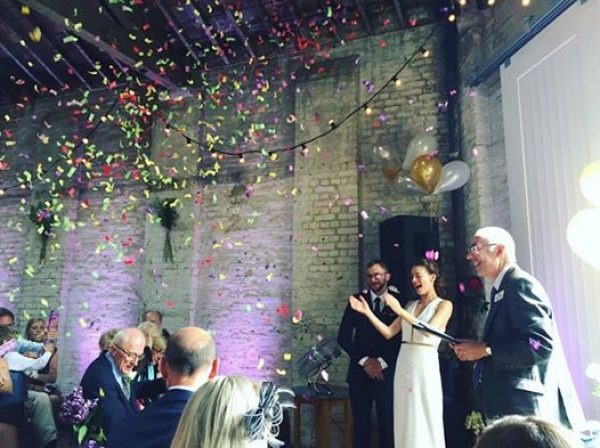
by Michael | Nov 6, 2017 | Blog
What makes a wedding ceremony stand out? What makes a unique wedding?
Of course, there are many contributory factors, such as the decor or flowers, but the ceremony itself is most likely to stick in the mind of your guests.
Maybe a unique service means a full religious one. You will know what you’re getting, so your choice will have been an informed one. But your service is likely to be conventional (rather than unique) and similar to other people’s.
If you’ve decided against a religious service, you may opt for the registrars (either at the Register Office or at a licensed venue that the registrars will come out to). As a minimum, you will need this, as this service includes the essential legal wording. The ceremony will usually last 10-15 minutes, and, however nice it may be, you will be part of a conveyor belt process. Again, not really a unique experience.
A creative option
Should you want religious elements (and you can’t or won’t use your church etc. for whatever reason), you can have a bespoke ceremony in addition to the registrars’ service.
Unlike the two types mentioned above, the civil celebrant-led ceremony will be unique. You and your celebrant will work together and compile a ceremony that reflects your beliefs and personalities, and will be everything you want it to be.
Possibilities
Examples of what you can include that may make your ceremony personal and special are: writing your own vows or putting together your story (how you met, what attracts you to each other, etc.).
However, there are many rituals which can make the ceremony stand out. They are too many to mention, but, to name but two, there could be the Unity Candle and a handfasting.
Unity Candle
You can have a special candle made, together with matching tapers. The two of you light the tapers and, together, light the Unity Candle. The symbolism is obvious! (Do take the wind into account, if it’s an outdoor wedding!)
Should you have teenage children, then they could light a taper too, and light the unity candle with you. (Similarly, you could do this in a sand ceremony.)
Handfasting
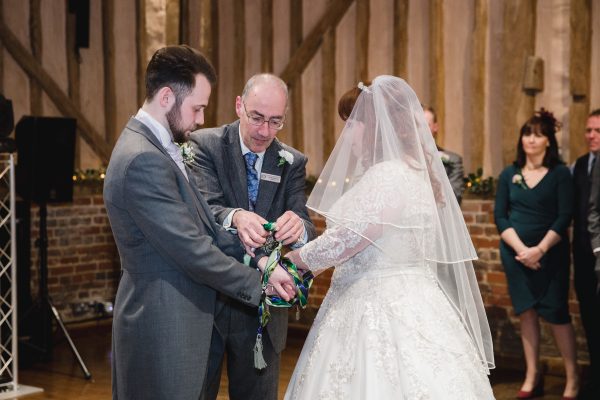
Source: louiedonovanphotography.co.uk
A handfasting is a symbolic binding of the four wrists. It can be over with in a minute or two or, in a pagan wedding, be part of a much longer ritual.
You choose a cord or ribbon of whatever colour(s) you want, but make sure it’s at least a metre long. You join hands with your partner – left hand to left, and right to right – and your wrists are then bound, as beautiful words are spoken by the celebrant. Oh, and after a while, you will be released!
So just a flavour of what you can do to make your wedding truly unique. To find out more, please contact me (07931 538487), and I’ll be delighted to help.








